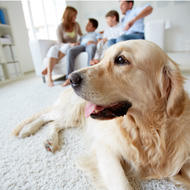Genes connected to social ability in dogs

“Our findings are the first to reveal genes that might have caused the extreme change in social behaviour that has occurred in dogs since they were domesticated."
New research, undertaken by scientists at Linköping University in Sweden, has revealed a link between genes affecting behaviour in both canines and humans.
Scientists found that four out of five genes affecting dogs’ interaction with humans, also linked to social disabilities in humans.
The new behavioural study observed 500 beagles with similar involvement with humans in their early life. Each dog was presented with an unsolvable problem and filmed to evaluate their behaviour. The mission was to remove a lid from a container, in order to retrieve a treat. The data collected analysed the dog’s inclination to seek contact with a human, upon realisation that the problem was too difficult.
Doctoral student and main author of the paper, Mia Persson, said: “We found a clear association with DNA regions that contain five different genes of interest. Four of the genes are previously known from studies of social disorders in humans, for instance autism and ADHD.”
Scientists looked at DNA from 200 of the dogs involved, exploring a large number of genetic variants, using a method called genome-wide association study (GWAS). The genome-wide study is used to identify common variants within subjects with specific traits. In this case, the dogs that sought human contact more often carried the same genetic variants.
Professor of ethology and leader of the research group, Per Jensen, said: “Our findings are the first to reveal genes that might have caused the extreme change in social behaviour that has occurred in dogs since they were domesticated.
“If the associations we have found can be confirmed in other dog breeds, it’s possible that dog behaviour can help us to better understand social disorders in humans.”
The research was funded in part by the European Research Council (ERC).



 FIVP has shared a survey, inviting those working in independent practice to share their views on the CMA's proposed remedies.
FIVP has shared a survey, inviting those working in independent practice to share their views on the CMA's proposed remedies.